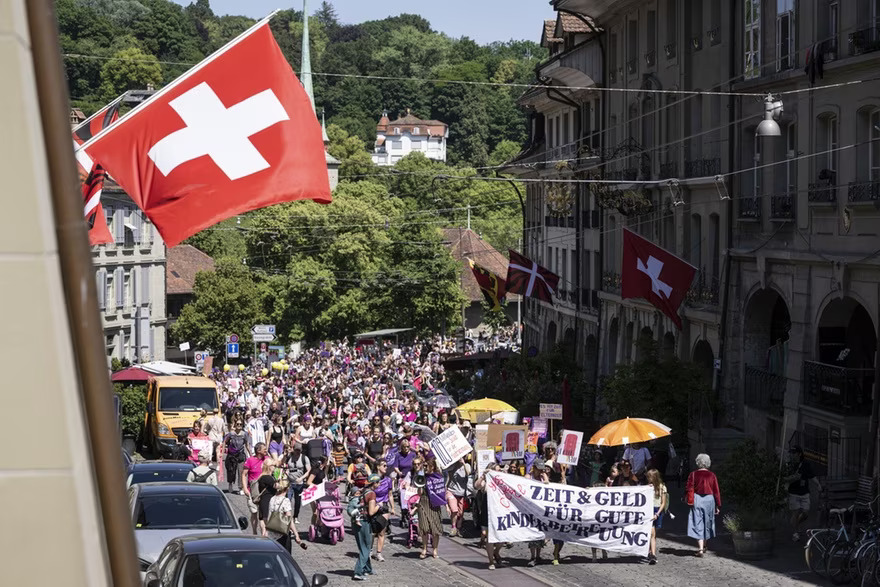On Wednesday, a massive national strike swept across Switzerland as over 300,000 women, children, and other protesters united in major towns and cities, vociferously demanding equal pay.
On a scorching summer day, the cities of Basel, Bern, Zurich, Lucerne, St. Gallen, Lausanne, and Geneva witnessed massive rallies and a multitude of events as part of the women’s strike. With over 300,000 participants nationwide, the Swiss Trade Union Federation reported an impressive turnout.
The focus of this year’s women’s strike, now officially known as the Feminist Strike, went beyond addressing the gender pay gap. While demanding equal pay, the protesters also raised their voices against various forms of workplace discrimination and harassment.
According to the Swiss Trade Union Federation, women in Switzerland earned an average of 43% less than men in the previous year. Part of this disparity can be attributed to women’s higher representation in part-time employment and lower-paid positions such as cleaning jobs.


However, even when performing comparable roles, women face an 18% wage gap compared to their male counterparts, making Switzerland one of the most unequal countries in Europe in terms of pay equity.
“Systematic measures are also needed at the national level to combat gender-based, sexual, and domestic violence,” said Green parliamentarian Sibel Arslan, one of the leading figures of the women’s movement.
Switzerland ratified the Istanbul Convention against violence against women and domestic violence in 2017. It is high time it implements its objectives, she added.
On Wednesday Interior Minister Alain Berset, who holds the rotating Swiss presidency this year, said he deplored the “unfortunate” situation women face in the workplace.
“Women often earn salaries that are lower than men and more regularly do unpaid work,” Berset said, addressing the International Labour Organization (ILO) in Geneva. “They are also victims of discrimination and harassment.”
Today’s strike action shows “how indignation can be turned into political action”, he added.
‘Virtually no Progress’
Switzerland’s most recent national women’s strike took place in 2019, and since then, the country’s Trade Union Federation has expressed dissatisfaction with the lack of significant progress in women’s rights. The 2019 women’s strike, organized by trade unions, saw an impressive gathering of nearly 500,000 individuals. It occurred almost three decades after the 1991 strike, during which women demanded that the constitutional article on gender equality be translated into tangible legislation.
June 14 holds particular significance as it commemorates the anniversary of the 1981 vote that constitutionally established the principle of equality in Switzerland. This date has been designated as a special day to highlight the ongoing fight for women’s rights in the country.

